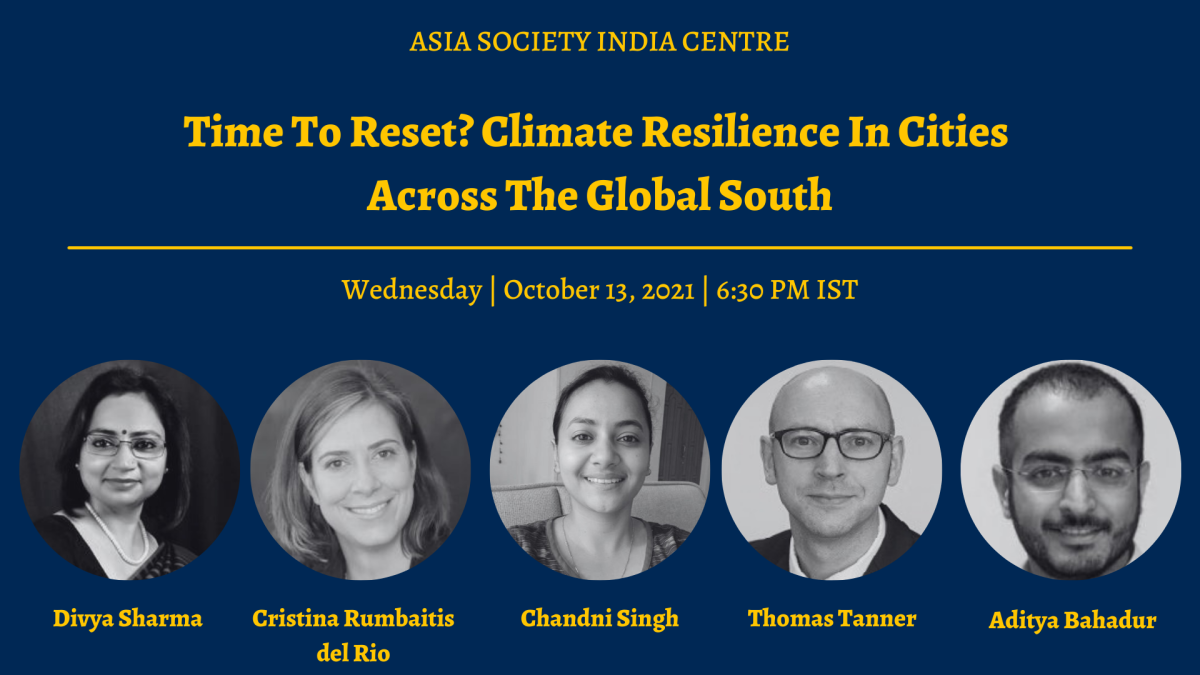Time To Reset? Climate Resilience in Cities Across the Global South
VIEW EVENT DETAILS
LIVE ON FACEBOOK
The United Nations (UN) projects that 70% of the world population will be living in cities by the year 2050. This trend is fast unfolding across the global south, with megacities in Asia and Africa accommodating newer residents every year. However, with the rise in urban population, concerns regarding climate-resilient urban frameworks have also intensified, especially across cities of the Global South. Urban areas are particularly exposed to climate change disasters, and a higher concentration of people either residing or perpetually migrating to cities makes this a significantly pressing future challenge. Therefore, with the rise of climate change and the increased frequency of natural disasters, the global south is particularly vulnerable to the effects of climate change. The existing narrative around urban resilience is largely dominated by large and megacities with inadequate research and insights on challenges in urbanisation faced by economically growing or backward nations.
Urban resilience is predominantly understood as a process where urban systems develop capabilities to adapt to changes, strengthen their resources to fight adversities and challenges and prepare themselves for ecological changes. However, studies suggest that many cities in low and middle-income countries have been struggling to adapt to climate changes and, as a result, have been unable to build adequate climate-resilient infrastructure. Experts state that in present times, especially post the COVID-19 pandemic, the concept of climate resilience cannot be limited to building an infrastructure that copes with extreme climate events alone. Emphasis is also required in areas of urban planning, citizen engagement, strengthening socio-political institutions and building strong financial and regulatory frameworks. More importantly, the evidence collection, discourse around urban revival and resilience and policymaking needs to incorporate nations from the global south. “With growing knowledge, the term ‘resilience’ is being used in the deeper sense of institutional, social and structural responses to calamities and adversity, as well as looking at whether or not these cities are part of a robust system to which they can bounce back,” writes Divya Sharma, Executive Director, Climate Group India.
In their most recent work, ‘Resilience Reset: Creating Resilient Cities in the Global South’, researchers and climate experts, Aditya Bahadur and Thomas Tanner highlight this issue and make a compelling argument of resetting present processes and systems in which urban bodies comprehend and incorporate resilience building. The book draws attention to the need for change in which urban policy planners analyse data, build scaleable response models, incorporate tech and AI and develop sustainable solutions for the future.
With the ongoing COVID-19 pandemic posing a newer set of challenges, how can we reset urban planning models and existing financial systems to meet challenges posed by frequently recurring climate disasters? How has COVID-19 and climate change influenced infrastructure planning and systems evaluation across cities in the global south? What are some innovative approaches undertaken by institutions to address rising climate change risks faced by cities? How can state institutions, civil society groups and corporate organisations work together to tackle this challenge?
Join us for a conversation on the need for revisiting and resetting traditional climate resilience frameworks in cities across the Global South, with Divya Sharma, Cristina Rumbaitis del Rio, Aditya Bahadur, Thomas Tanner and Chandni Singh.

Divya Sharma is Executive Director at the Climate Group, India and Chair & Whole-time Director, India Board of Directors. She is an international climate and urban development expert, specialising in climate resilience and urban development planning, with almost 20 years of experience operating throughout India and internationally.

Cristina Rumbaitis del Rio is a Senior Adaptation and Resilience Advisor with the Climate Resilience Practice. Previously she was the Action Track Co-Manager for the Global Commission on Adaptation and Regional Programme manager for Action on Climate Today, a £23 million UK AID supported climate change programme that mainstreamed resilience into planning and budgeting at the national and sub-national level in India, Pakistan, Nepal, Bangladesh and Afghanistan.

Dr. Thomas Tanner serves as the Director of the Centre for Development, Environment and Policy, SOAS University of London. He is a development geographer with a background in environmental change, development studies, environmental economics and political science. He specialises in building resilience and adaptation to climate change through research, policy and practice.

Chandni Singh serves as a Senior Research Consultant at The Indian Institute for Human Settlements (IIHS). She works on issues of climate change adaptation, differential vulnerability and wellbeing, disaster risk, and rural-urban migration. Her main domains of work fall under the scope of human dimensions of global environmental change and include climate change adaptation, disaster risk reduction, natural resource management, climate information services, livelihood transformations, and human migration with a thrust on using participatory methods.

Aditya Bahadur is the Principal Researcher in Human Settlements at the International Institute for Environment and Development. He is a specialist in climate-resilient urban development, transformative approaches for risk reduction, monitoring and evaluation of resilience initiatives, designing and delivering research and learning programmes on climate and development, supporting governments in policy and institutional development for resilience with a focus on South and Southeast Asia.